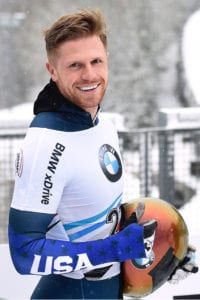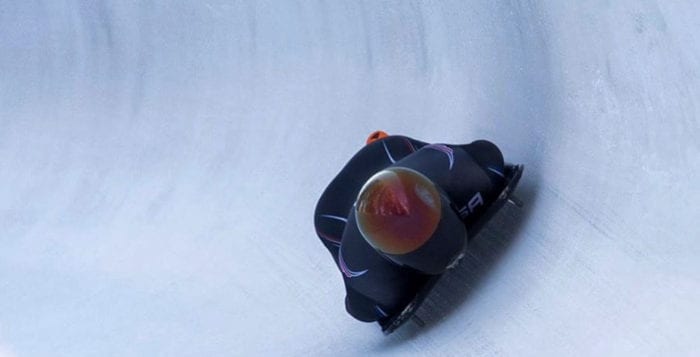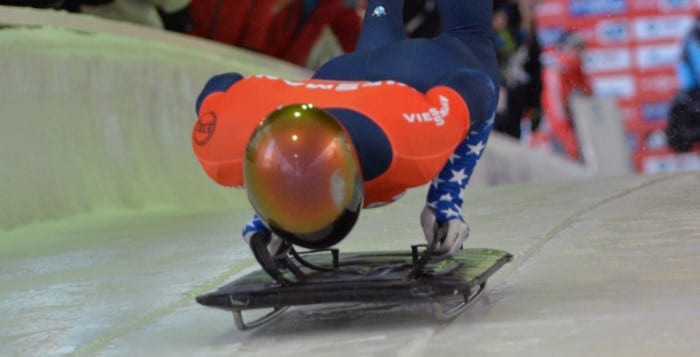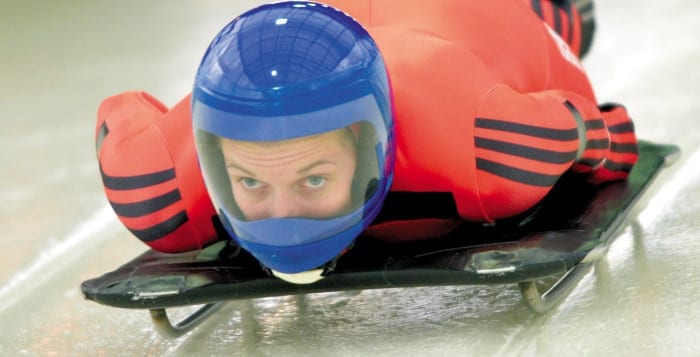Four years ago, Smithtown resident James Daly took his son John aside. The younger Daly had been in position to realize a long-held dream, only to see that dream slip away, as if it, and his sled, had slipped into a nightmare on Russian ice.
Competing in his second Olympics in the fast-paced sport of skeleton racing, John Daly was in fourth place in the Sochi Winter Olympics going into the final run of a four-heat race when his sled popped out of the grooves at the top of the mountain. That slip cost him time he could not afford to lose, sending him down to 15th place, and after the race, into retirement.

Daly’s father grabbed him and said, “What happens to you today will make you the man that you’ll be tomorrow,” the son recalled.
At the moment, Daly barely registered the words, as the agony of defeat was so keen that he walked away from a sport that had helped define his life over the last 13 years.
His retirement, however, only lasted two. Daly wanted to rewrite his Olympic script.
The Smithtown native recently learned that he would represent the United States for a third time at the Winter Olympics, completing a comeback that required him to make marathon nine-hour drives from Virginia, where he’d gotten a job as a sales representative at medical technology company Smith & Nephew, to Lake Placid, where he returned to familiar stomping grounds.
A race official for bobsled and skeleton, the elder Daly continued to trek to the top of snowy and wind-whipped mountains, recognizing in the back of his mind that the middle of his three children might one day return to a sport where competitors sprint with a hand on their sled for five seconds and then dive headfirst onto a brakeless vehicle that can reach speeds in excess of 80 miles per hour.
When he learned his son made the Olympic team that will compete in Pyeongchang, South Korea next month, Daly couldn’t contain his enthusiasm.
“I’ve been telling everybody,” the retired EMS worker for the FDNY said with a laugh, even including random people he meets at the gym.
“When people watch the Olympic games on TV, they see a person from a town they never heard of,” James Daly said. “Now, all of a sudden, they see Smithtown. It’s great.”
The racing Daly, who is now 32, had a long road back to reclaim a spot on the American team. For starters, he had to go back to North America Cup races, the junior circuit of racing.
“Daly never really lost it. It was quite amazing to see.”
— Tuffy Latour
Daly “never really lost it,” said Tuffy Latour, the head coach of the USA skeleton team. “It was quite amazing to see. We were quite pleased.”
In January of last year, Daly earned a gold medal at Salt Lake City and followed that up with a gold and silver at Lake Placid.
Not only was his proud father there to celebrate John’s return, James also put the hardware around his neck.
“He’s been there from the time I went down the mountain the first time,” John said. “He’s always been there and for him to be there again, to put the medal on me for my first race back, it felt right.”
The pair joked while celebrating the first of several America’s Cup medals that the success felt familiar, like Daly was never gone.
At this point, Daly said he feels that the track in South Korea where he will square off against veteran sliders, including his longtime friend and teammate Matt Antoine, plays to his strengths. Latour said the American team is in a similar position preparing for South Korea as it was going into Sochi.
“We had a test of it last year in the World Cup,” the coach said. “The results were similar to what we had [in 2014].”
Latour said it sometimes helps to walk away for a few years and come back refreshed. He highlighted Daly’s experience as an asset in preparation for the 2018 games.
“He has nothing to lose,” said Latour, who appreciates how Daly’s comedic side helps steady his teammates during competition. He said Daly has the same energy he had before he left the race. “It’s great to have him around.”

Daly said he’s proud to represent the United States. After he retired, he went to the gym, where he’d see people wearing sweatshirts emblazoned with the names of the colleges they’d attended. His sweatshirts read “USA.”
“That USA represents every college,” said Daly. “It’s a good feeling to wear it.”
At the South Korea games, Daly will be without teammate and friend Steve Holcomb, who died last year at 37. Holcomb’s story, including a recovery from an eye disease that made him nearly blind to a gold medal-winning driver of the celebrated Night Train sled, inspired people around the world, as well as his teammates.
As with his fellow bobsled and skeleton racers, Daly will be flying down the mountain in a suit that has Holcomb’s initials on it.
Daly will spend a next few weeks preparing for one more chance in the Olympics.
During the training to get back, Daly said his body and his mind demanded to know why he’s going through this work again.
He told himself: “I’m here to finish my career off the way I’d like.”
Bennarda Daly, who will attend the Olympics with her husband, said the South Korea Olympics will give her son something he didn’t get from the games in Russia.
“In South Korea,” she said, “he will finally get closure.”







